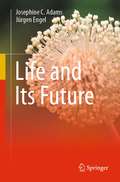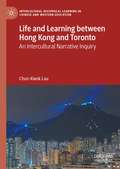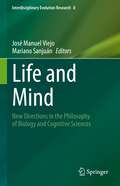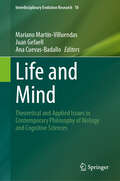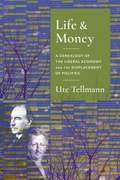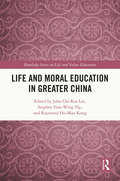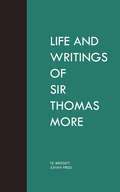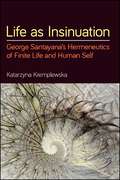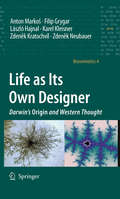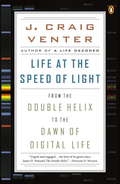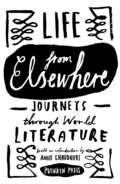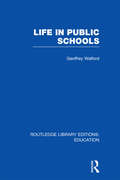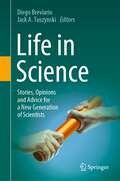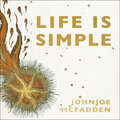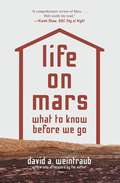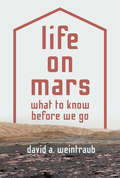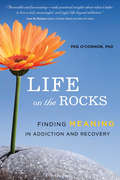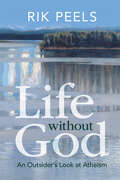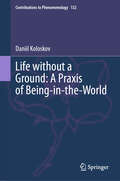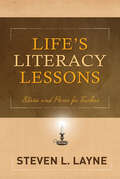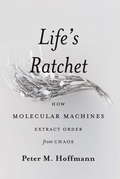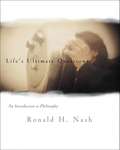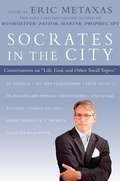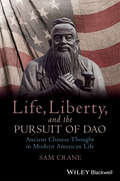- Table View
- List View
Life and Its Future
by Jürgen Engel Josephine C. AdamsThis book is aimed at those who wish to understand more about the molecular basis of life and how life on earth may change in coming centuries. Readers of this book will gain knowledge of how life began on Earth, the natural processes that have led to the great diversity of biological organisms that exist today, recent research into the possibility of life on other planets, and how the future of life on earth faces unprecedented pressures from human-made activities. Readers will obtain a perspective on the potential risks of chemical or nuclear warfare, and the ever-increasing risks from human activities that are causing pollution and climate change with global heating. Readers will also learn about ongoing research efforts to generate “designer lifeforms” through synthetic biology and applications of artificial intelligence. The book makes an integrated, up-to-date, overview of topics often considered as separate fields. It should be valuable to students, teachers, and people who are concerned about the future of life.
Life and Learning Between Hong Kong and Toronto: An Intercultural Narrative Inquiry (Intercultural Reciprocal Learning in Chinese and Western Education)
by Chun-Kwok LauThis book presents a narrative inquiry into the cross-cultural educational experiences of a family living in Hong Kong and Toronto, Canada. At heart a go-and-return story, Lau reflects on the difficulties of adjusting to the different practices of teaching and learning in two places with their own distinctive cultures. Ever more prescient now amid the current social and political upheavals in Hong Kong and around the world, the book considers the profound impacts such transitions have on families. By delving into the challenges of living, working, and learning across cultures, he reflects upon the deep-rooted values in both family and school landscapes to gain new insights about educational and cultural practices in Hong Kong and Toronto.
Life and Mind: New Directions in the Philosophy of Biology and Cognitive Sciences (Interdisciplinary Evolution Research #8)
by José Manuel Viejo Mariano SanjuánThis volume provides a broad overview of some cutting-edge philosophical topics of growing interest at the juncture between cognitive science and biology. The main goal is not to integrate the variety of approaches into a single account, but rather to offer diverse perspectives on a collection of selected biological issues of particular philosophical relevance, reflecting the plurality of current research in these areas. Four conceptual vectors give this volume its coherence: Animal and human cognition: With respect to animal cognition, this volume focuses on self-awareness and methodological flaws in the science of animal consciousness. Regarding human cognition, the authors of this volume address various aspects of so-called 4E cognition. Genetics: The role of genes in the development of mind and life has always been philosophically controversial. In this volume, the authors address the possibility of considering post-genomic genes as natural kinds and the proper analysis of the concept of genotype. Teleology: This volume addresses issues of evolutionary causality and teleosemantics, as well as questions relating to biological teleology and regulation. Evolution: Evolution exemplifies better than any other concept the convergence point between philosophy, biology and cognitive sciences. Among other things, the volume deals with the origin of novelties in evolutionary processes from various viewpoints (e.g., cultural evolution and developmental plasticity). Despite their disparity, all these topics belong to a common naturalistic framework. By presenting them in a single volume, the editors want to emphasize the need to always conduct philosophical research on mind and life with tangential domains in mind.This book is a valuable resource for students and researchers of philosophy with a special interest in life, cognition, and evolution, as well as for biologists and cognitive scientists.
Life and Mind: Theoretical and Applied Issues in Contemporary Philosophy of Biology and Cognitive Sciences (Interdisciplinary Evolution Research #10)
by Mariano Martín-Villuendas Juan Gefaell Ana Cuevas-BadalloIn recent times, the philosophy of science has been reinvigorated by insights from the biological and cognitive sciences. These disciplines have provided not only new perspectives to approach traditional philosophical problems but have also opened the way to new conceptual and methodological questions that call for new and innovative solutions. This book brings together some of the main debates that have structured in the last years the fields of philosophy of biology and cognitive sciences. It is organized around 11 chapters distributed in two parts: one devoted to the philosophy of biology, and the other to the cognitive sciences. These ideas were originally presented at the 11th edition of the International Philosophy of Biology and Cognitive Science (PBCS-XI) workshop held in 2022 in Salamanca, Spain. Part I of the volume is devoted to topics related to the philosophy of biology and includes hot topics such as “biological functions”, “modelization”, “pain medicine”, or “organicism”. Part II is devoted to debates in the cognitive sciences and includes issues related to "ecological psychology", "enactivism", "FEP" or "animal cognition". Considering the diversity of the topics covered in this volume, the book is purposely conceived to serve as an updated introduction to the fields of the philosophy of biology and cognitive sciences for those researchers interested in having a panoramic view of these two areas of inquiry. But not only that, the detailed and scholarly coverage of the topics included renders this book appealing to a much more specialized audience interested in particular aspects of each of the debates already mentioned.
Life and Money: The Genealogy of the Liberal Economy and the Displacement of Politics (Columbia Studies in Political Thought / Political History)
by Ute Astrid TellmannLife and Money uncovers the contentious history of the boundary between economy and politics in liberalism. Ute Tellmann traces the shifting ontologies for defining economic necessity. She argues that our understanding of the malleability of economic relations has been displaced by colonial hierarchies of civilization and the biopolitics of the nation. Bringing economics into conversation with political theory, cultural economy, postcolonial thought, and history, Tellmann gives a radically novel interpretation of scarcity and money in terms of materiality, temporality, and affect.The book investigates the conceptual shifts regarding economic order during two moments of profound crisis in the history of liberalism. In the wake of the French Revolution, Thomas Robert Malthus’s notion of population linked liberalism to a sense of economic necessity that stands counter to political promises of equality. During the Great Depression, John Maynard Keynes’s writings on money proved crucial for the invention of macroeconomic theory and signaled the birth of the managed economy. Both periods, Tellmann shows, entail a displacement of the malleability of the economic. By tracing this conceptual history, Life and Money opens up liberalism, including our neoliberal present, to a new sense of economic and political possibility.
Life and Moral Education in Greater China (Routledge Series on Life and Values Education)
by John Chi-Kin Lee Stephen Yam-Wing Yip Raymond Ho-Man KongArguing for life, moral and values education as a bedrock for the original goals of school education, this monograph explores how life and values education is conceptualised and imparted in Greater China. Under a globalized, transnational, and technological world, where there has been an increase in people’s mobility, in information and cultural exchanges, there is also a growing emphasis on personal and professional ethics. Against this context, life, moral and values education has gained attention for its impact on shaping students' characters as future citizens. However, the cultivation of these values is made deeply diversified and complex by varying interpretations of "life education" and "values education" across societies, given that different societies are influenced by different socio-cultural traditions, educational ideologies and religious beliefs. The means and approaches towards life education also vary vastly from formal school subjects, school-based programmes as well as teachers and peers’ role modelling, community services, extra-curricular activities, school discipline, charity work, pastoral care, and school ethos. Recognising this inherent diversity and complexity in the approach to and the dissemination of life education, the contributors to this volume survey the practice of life education in Greater China so far, suggesting that life education is most effective when it is "diversified, dynamic and developmental across contexts". This book will provide the opportunity for engaging in important and serious debates about the future and the values that will underpin it and will prove of special interest to scholars and practitioners working on education policies curriculum development and teacher education in Greater China.
Life and Writings of Sir Thomas More: Lord Chancellor Of England And Martyr Under Henry Viii
by T. E. BridgettAfter this review of More’s public life and period of prosperity, the reader will be interested to know what was his interior life before God. In addition to what has been said of this by his biographers, especially Roper and Stapleton, as related in previous chapters, we have a picture of a holy statesman drawn by his own pen, in which he has unconsciously described himself; or rather we have an account given of a method of sanctification, which we know from other sources to have been the one so successfully adopted by himself.
Life as Insinuation: George Santayana's Hermeneutics of Finite Life and Human Self (SUNY series in American Philosophy and Cultural Thought)
by Katarzyna KremplewskaIn this book, Katarzyna Kremplewska offers a thorough analysis of Santayana's conception of human self, viewed as part of his larger philosophy of life. Santayana emerges as an author of a provocative philosophy of drama, in which human life is acted out. Kremplewska demonstrates how his thought addresses the dynamics of human self in this context and the possibility of sustaining self-integrity while coping with the limitations of finite life. Focusing on particular aspects of Santayana's thought such as his conception of the tragic aspect of existence, and the role of the doctrine of spirit in his philosophical anthropology and critique of culture, this book also sets Santayana's thought in substantial dialogue with other thinkers, such as Heidegger, Bergson, and Nietzsche. Like Santayana's philosophy, this book seeks to build passages between theoretical reflection and practical life with the possibility of a good life in view.
Life as Its Own Designer
by Zdenek Neubauer László Hajnal Zdenek Kratochvíl Filip Grygar Karel Kleisner Anton MarkošIt has been nearly 150 years since Darwin published On the Origin of Species, and his theory of natural selection still ignites a forest of heated debate between scientific fundamentalists on the one hand and religious fundamentalists on the other. But both sides actually agree more than they disagree, and what has long been needed is a third way to view evolution, one that focuses more on the aspect of life and "being alive", one that can guide us through, and perhaps out of, the fiery thicket. This book, a seminal work in the burgeoning field of Biosemiotics, provides that third way, by viewing living beings as genuine agents designing their communication pathways with, and in, the world. Already hailed as the best account of biological hermeneutics, Life As Its Own Designer: Darwin's Origin and Western Thought is a wholly unique book divided into two parts. The first part is philosophical and explores the roots of rationality and the hermeneutics of the natural world with the overriding goal of discovering how narrative can help us to explain life. It analyzes why novelty is so hard to comprehend in the framework of Western thinking and confronts head-on the chasm between evolutionism and traditional rationalistic worldviews. The second part is scientific. It focuses on the life of living beings, treating them as co-creators of their world in the process of evolution. It draws on insights gleaned from the global activity of the Gaian biosphere, considers likeness as demonstrated on homology studies, and probes the problem of evo-devo science from the angle of life itself. This book is both timely and vital. Past attempts at a third way to view evolution have failed because they were written either by scientists who lacked a philosophical grounding or New Age thinkers who lacked biological credibility. Markoš and his coworkers form an original group of thinkers supremely capable in both fields, and they have fashioned a book that is ideal for researchers and scholars from both the humanities and sciences who are interested in the history and philosophy of biology, biosemiotics, and the evolution of life.
Life at the Speed of Light
by J. Craig VenterThe renowned scientist and author of A Life Decoded examines the creation of life in the new field of synthetic genomics.
Life from Elsewhere: Journeys Through World Literature
by Various Amit ChaudhuriWriters in Translation, established in 2005 and supported by Bloomberg and Arts Council England, champions the best literature from around the world. To mark the programme's tenth anniversary, ten leading writers from around the world, many of whom have been supported in their work by English PEN, explore the themes of movement, freedom and narrative. Introduced by Amit Chaudhuri, the collection includes contributions from:Asmaa al Ghul - Palestine resident; originally from Bangladesh - Translated from the Arabic by Elisabeth JaquetteMahmoud Dowlatabadi - Iran - Translated from the Persian by Ahmad Karimi-HakkakAyelet Gundar-Goshen - Israel - Translated from the Israeli by Sondra SilverstonChan Koonchung - Born in Shanghai; raised in Hong KongHanna Krall - Poland - Translated from the Polish by Philip BoehmAndrey Kurkov - Russia - Translated from the Russian by Amanda Love DarraghAndrés Neuman - Born in Argentina; moved to Spain - Translated from the Spanish by Nick CaistorAlain Mabanckou - Born in Congo; raised in France; lives in America - Translated from the French by Helen StevensonElif Shafak - TurkeySamar Yazbek - Syria - Translated from the Arabic by Ruth Ahmedzai KempFrom the Trade Paperback edition.
Life in Public Schools (Routledge Library Editions: Education)
by Geoffrey WalfordBritain’s public (that is, its major independent) schools have a conspicuous role in the country’s social system, and as a result are the subject of a long-standing political debate. The discussion is generally founded on a stereotyped image of what these school may have been like in the 1950s – this books shows how they were in the late 1980s. It is based on fieldwork in two major public boarding schools which the author conducted over an extended period, and draws on interviews, observation and documentary sources to establish a picture of what public school life is actually like for pupils and staff. Since the schools were predominantly male preserves, the major part of the book describes the social world and experiences of boys and school-masters. An important section of the book, however, discusses the introduction of girl pupils, the experiences of female teachers and the way schoolmasters’ wives tend to be drawn into their husbands’ work. Geoffrey Walford’s conclusions about life in public schools differ considerably from traditional expectations. At the same time he asks whether there really has been a ‘public school revolution’. His book makes an important contribution to our knowledge of public schools, to debates in the sociology of education and to the issues of abolishing or extending the independent sector.
Life in Science: Stories, Opinions and Advice for a New Generation of Scientists
by Jack A. Tuszynski Diego BreviarioThis book is a collection of stories, reflections and advice written by proficient scientists. They address the question of what doing science means to them, and describe attitudes and working practices that have proved effective and rewarding. The book is aimed in particular at young people who are attracted by science or already undertaking undergraduate studies, and who are considering making science their long-term profession. It will also be helpful and revealing to early-career scientists who are searching for their own best route to success. The book serves as a platform for experienced scientists to describe their original inclination, how that subjective disposition found its expression in their way of doing science, whether their expectations were met, and what achievements they can claim. But it is not restricted to success: contributors also share details of the limitations and failures they have encountered. Last but not least they describe how they see science now, how they think it will be in the near future, and what advice they would give to the their much younger colleagues. Readers will appreciate the diversity of the individual paths shaped by different education, motivation, ambition, inclination, intuition, feeling, belief and eligibility. At the same time the stories confirm that science relies on a translation of this subjective level into an objective level, one that is shared and accepted by the international scientific community, and whose results are produced with a commonly accepted and fully rational scientific method of investigation.
Life is Simple: How Occam's Razor Set Science Free And Unlocked the Universe
by JohnJoe McFaddenLife is Simple tells the remarkable story of how a thirteenth century monk's search for simplicity led to the emergence of the modern world.We begin in the turbulent times of the medieval friar, William of Occam, who first articulated the principle that the best answer to any problem is the simplest. This theory, known as Occam's razor, cut through the thickets of medieval metaphysics to clear a path for modern science. We follow the razor in the hands of the giants of science, from Copernicus, to Kepler, Galileo, Newton, Darwin, Einstein, Rubin and Higgs. Its success suggests that we live in the simplest possible habitable universe and supports the revolutionary theory that our cosmos has evolved.By highlighting the very human passion, curiosity, mistakes and struggles of those who were inspired by Occam's razor to create the modern world, Johnjoe McFadden provides new insight into what science is really about. And that the principle of simplicity is as relevant today as ever.(P) 2021 Hodder & Stoughton Limited
Life on Mars: What to Know Before We Go
by David A. WeintraubThe search for life on Mars—and the moral issues confronting us as we prepare to send humans thereDoes life exist on Mars? The question has captivated humans for centuries, but today it has taken on new urgency. As space agencies gear up to send the first manned missions to the Red Planet, we have a responsibility to think deeply about what kinds of life may already dwell there—and whether we have the right to invite ourselves in. Telling the complete story of our ongoing quest to answer one of the most tantalizing questions in astronomy, David Weintraub grapples with the profound moral and ethical questions confronting us as we prepare to introduce an unpredictable new life form—ourselves—into the Martian biosphere. Now with an afterword that discusses the most recent discoveries, Life on Mars explains what we need to know before we go.
Life on Mars: What to Know Before We Go
by David WeintraubThe story of the search for life on Mars—and the moral issues confronting us as we prepare to send humans thereDoes life exist on Mars? The question has captivated humans for centuries, but today it has taken on new urgency. NASA plans to send astronauts to Mars orbit by the 2030s. SpaceX wants to go by 2024, while Mars One wants to land a permanent settlement there in 2032. As we gear up for missions like these, we have a responsibility to think deeply about what kinds of life may already inhabit the planet--and whether we have the right to invite ourselves in. This book tells the complete story of the quest to answer one of the most tantalizing questions in astronomy. But it is more than a history. Life on Mars explains what we need to know before we go.David Weintraub tells why, of all the celestial bodies in our solar system, Mars has beckoned to us the most. He traces how our ideas about life on Mars have been refined by landers and rovers, terrestrial and Mars-orbiting telescopes, spectroscopy, and even a Martian meteorite. He explores how finding DNA-based life on the Red Planet could offer clues about our distant evolutionary past, and grapples with the profound moral and ethical questions confronting us as we prepare to introduce an unpredictable new life form—ourselves—into the Martian biosphere.Life on Mars is also a book about how science is done—and undone—in the age of mass media. It shows how Mars mania has obscured our vision since we first turned our sights on the planet and encourages a healthy skepticism toward the media hype surrounding Mars as humanity prepares to venture forth.
Life on the Rocks
by Peg O'ConnorAddiction and recovery are, at their core, about the meaning of life. Life on the Rocks is the first book to address addiction and recovery from a Western philosophical perspective, offering a powerful set of tools sharpened over millennia. It introduces some of the core concepts and vexing questions of philosophy to help addicts and those affected by their addiction examine and perhaps transform the meaning they make of their lives.Without assuming any familiarity with philosophy, Dr. O'Connor illuminates issues all addicts and their loved ones face: self-identity, moral responsibility, self-knowledge and self-deception, free will and determinism, fatalism, the nature of God, and their relations to others. Life on the Rocks is an indispensable guide to the deeply philosophical concerns at the heart of every addict's struggle.Peg O'Connor, PhD, is professor of philosophy and gender, women, and sexuality studies at Gustavus Adolphus College in Minnesota. She is the author of the popular Psychology Today blog "Philosophy Stirred, Not Shaken" and contributor to the Pro Talk series at Rehabs.com.
Life without God: An Outsider's Look at Atheism
by Rik PeelsIn this book, Rik Peels explores atheism from a new perspective that aims to go beyond the highly polarized debate about arguments for and against God's existence. Since our beliefs about the most important things in life are not usually based on arguments, we should look beyond atheistic arguments and explore what truly motivates the atheist. Are there certain ideals or experiences that explain the turn to atheism? Could atheism be the default position for us, not requiring any arguments whatsoever? And what about the often-discussed arguments against belief in God—is there something that religious and nonreligious people alike can learn from them? This book explores how a novel understanding of atheism is possible – and how it effectively moves the God debate further. Believers and non-believers can learn much from Peel's assessment of arguments for and against atheism.
Life without a Ground: A Praxis of Being-in-the-World (Contributions to Phenomenology #132)
by Daniil KoloskovThis book argues for the pragmatist thesis of the primacy of praxis on a phenomenological basis. Demonstrating the relevance of phenomenology, it provides a systematic overview of the contemporary pragmatic landscape, taking into account not only a family of neo-pragmatic approaches but also the current pragmatic readings of phenomenology. This volume offers an innovative formulation of the primacy of practice thesis based on the genetic reformulation of Heidegger’s notions of disclosure, Dasein, and average intelligibility (Das Man). Investigating the dynamic interrelation among those notions, the author arrives at the phenomenological conception of forms of life or average background practices and argues that a form of life is not a pragmatic condition of meaningfulness but an outcome of the dynamic process of meaning-formation. This text concludes that the formation of meaning has no overarching origin but sources from the bundle of disparate practical spaces, and is ‘anarchic’ in nature. It appeals to students and researchers working in phenomenology and philosophical anthropology.
Life's Literacy Lessons: Stories and Poems for Teachers
by Steven LayneThis poignant collection of stories and poems honors literacy educators for the often difficult and always essential work they do with students of all ages. A well-loved classic, Life's Literacy Lessons , is back in print by popular demand and now includes stories as well as new poems. From reading aloud to grammar, from handwriting to standards, Steven Layne highlights the tears and laughter, the challenges and rewards that inspire today's teachers. And Steven reveals his motivation-;the events, words, and thoughts that led him to capture his musings in verse and prose. Whether you read them to inspire or entertain, these delightful poems and stories are sure to capture your imagination.
Life's Ratchet: How Molecular Machines Extract Order from Chaos
by Peter M. HoffmannThe cells in our bodies consist of molecules, made up of the same carbon, oxygen, and hydrogen atoms found in air and rocks. But molecules, such as water and sugar, are not alive. So how do our cellsOCoassemblies of otherwise OC deadOCO moleculesOCocome to life, and together constitute a living being? In "LifeOCOs Ratchet," physicist Peter M. Hoffmann locates the answer to this age-old question at the nanoscale. The complex molecules of our cells can rightfully be called OC molecular machines, OCO or OC nanobotsOCO; these machines, unlike any other, work autonomously to create order out of chaos. Tiny electrical motors turn electrical voltage into motion, tiny factories custom-build other molecular machines, and mechanical machines twist, untwist, separate and package strands of DNA. The cell is like a cityOCoan unfathomable, complex collection of molecular worker bees working together to create something greater than themselves. Life, Hoffman argues, emerges from the random motions of atoms filtered through the sophisticated structures of our evolved machinery. We are essentially giant assemblies of interacting nanoscale machines; machines more amazing than can be found in any science fiction novel. Incredibly, the molecular machines in our cells function without a mysterious OC life force, OCO nor do they violate any natural laws. Scientists can now prove that life is not supernatural, and that it can be fully understood in the context of science. Part history, part cutting-edge science, part philosophy, "LifeOCOs Ratchet" takes us from ancient Greece to the laboratories of modern nanotechnology to tell the story of our quest for the machinery of life. a
Life's Ultimate Questions: An Introduction to Philosophy
by Ronald H. NashThis book on introductory philosophy, synthesizes three distinct approaches -- topical, historical, and worldview/conceptual systems.
Life, God, and Other Small Topics
by Eric MetaxasThis book is for the seeker in all of us, the collector of wisdom, and the person who asks, "What if?" from the author of Seven Men: And the Secret of Their Greatness The Greek philosopher Socrates famously said that "the unexamined life is not worth living." Using this as a starting point, Eric Metaxas created a forum encouraging successful professionals to actively think about life's bigger questions. Thus, Socrates in the City was born. First presented to standing-room-only crowds in New York City and written by luminaries such as Dr. Francis Collins, Sir John Polkinghorne, and Os Guinness, these original essays grapple with extraordinary topics from "Making Sense out of Suffering" to "Belief in God in an Age of Science." No question is too big--in fact, the bigger, the better--because nowhere is it written that finding the answers to life's biggest questions shouldn't be exciting and even, perhaps, fun.
Life, God, and Other Small Topics: Conversations from Socrates in the City
by Eric MetaxasThis book is for the seeker in all of us, the collector of wisdom, and the person who asks, "What if?" from the author of Seven Men: And the Secret of Their GreatnessThe Greek philosopher Socrates famously said that "the unexamined life is not worth living." Using this as a starting point, Eric Metaxas created a forum encouraging successful professionals to actively think about life's bigger questions. Thus, Socrates in the City was born.First presented to standing-room-only crowds in New York City and written by luminaries such as Dr. Francis Collins, Sir John Polkinghorne, and Os Guinness, these original essays grapple with extraordinary topics from "Making Sense out of Suffering" to "Belief in God in an Age of Science." No question is too big--in fact, the bigger, the better--because nowhere is it written that finding the answers to life's biggest questions shouldn't be exciting and even, perhaps, fun.
Life, Liberty, and the Pursuit of Dao
by Sam CraneThis highly original work introduces the ideas and arguments of the ancient Chinese philosophies of Confucianism and Daoism to some of the most intractable social issues of modern American life, including abortion, gay marriage, and assisted suicide.Introduces the precepts of ancient Chinese philosophers to issues they could not have anticipatedRelates Daoist and Confucian ideas to problems across the arc of modern human life, from birth to deathProvides general readers with a fascinating introduction to Chinese philosophy, and its continued relevanceOffers a fresh perspective on highly controversial American debates, including abortion, stem cell research, and assisted suicide
